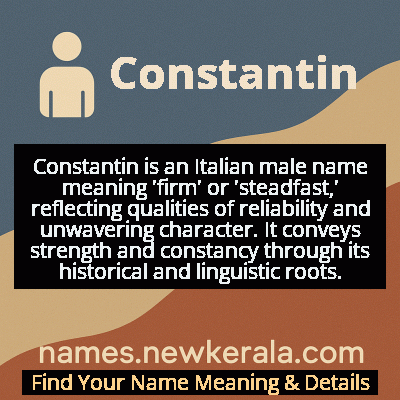Constantin Name Meaning & Details
Origin, Popularity, Numerology Analysis & Name Meaning of Constantin
Discover the origin, meaning, and cultural significance of the name CONSTANTIN. Delve into its historical roots and explore the lasting impact it has had on communities and traditions.
Name
Constantin
Gender
Male
Origin
Italian
Lucky Number
3
Meaning of the Name - Constantin
Constantin is an Italian male name meaning 'firm' or 'steadfast,' reflecting qualities of reliability and unwavering character. It conveys strength and constancy through its historical and linguistic roots.
Constantin - Complete Numerology Analysis
Your Numerology Number
Based on Pythagorean Numerology System
Ruling Planet
Jupiter
Positive Nature
Optimistic, inspirational, and creative.
Negative Traits
Scattered, exaggerating.
Lucky Colours
Yellow, gold, purple.
Lucky Days
Thursday.
Lucky Stones
Yellow sapphire.
Harmony Numbers
1, 2, 9.
Best Suited Professions
Arts, writing, communication.
What People Like About You
Creativity, optimism.
Famous People Named Constantin
Constantin Brâncuși
Sculptor
Pioneer of modern sculpture, known for abstract works like 'Bird in Space'
Constantin Stanislavski
Theatre director and actor
Developed the Stanislavski system of acting, influencing modern theater worldwide
Constantin von Tischendorf
Biblical scholar
Discovered the Codex Sinaiticus, one of the oldest complete Bibles
Constantin Noica
Philosopher
Influential Romanian philosopher and writer of the 20th century
Name Variations & International Equivalents
Click on blue names to explore their detailed meanings. Gray names with will be available soon.
Cultural & Historical Significance
In Italian culture specifically, while the form 'Costantino' is more common, Constantin appears in historical contexts and among families with Byzantine or Eastern Orthodox connections, reflecting Italy's complex relationship with the Eastern Roman Empire. The name symbolizes endurance, tradition, and historical continuity, often chosen to honor family heritage or religious devotion. Throughout the Renaissance and into modern times, Constantin has maintained its association with strength of character and unwavering principle.
Extended Personality Analysis
Individuals named Constantin are typically perceived as reliable, determined, and principled. They often exhibit strong leadership qualities combined with a methodical approach to life's challenges, reflecting the name's meaning of steadfastness. Their constancy makes them excellent friends and partners who value loyalty and tradition. Constantins tend to be deeply thoughtful individuals who consider decisions carefully before acting, showing remarkable patience and perseverance in pursuing their goals.
They often possess a quiet strength that inspires confidence in others, and while they may appear reserved initially, they reveal warm, protective natures to those they trust. This combination of intellectual depth and emotional stability makes them natural problem-solvers and trusted advisors in both personal and professional contexts. Their inherent reliability means they often become the stabilizing force in families and organizations, providing consistent support through changing circumstances.
Modern Usage & Popularity
In contemporary times, Constantin maintains a distinguished presence, particularly in Italian and European contexts where it's valued for its classical roots and sophisticated sound. While not among the most popular names in Italy today, it enjoys steady usage among families appreciating historical and traditional names. The name has seen a modest revival in recent years as parents seek strong, meaningful names with cultural depth. In Italy, it's more commonly found in its Italian form 'Costantino,' but Constantin appears in regions with specific historical connections or among families with multinational backgrounds. The name conveys an air of refinement and permanence, appealing to those who value heritage and substance over fleeting naming trends.
Symbolic & Spiritual Meanings
Symbolically, Constantin represents endurance, reliability, and the triumph of perseverance over adversity. The name evokes images of ancient pillars and foundations - structures that withstand the test of time through their inherent strength and stability. It symbolizes the human capacity for unwavering commitment to principles and loved ones, serving as a metaphor for moral fortitude in challenging circumstances. In a broader sense, Constantin embodies the concept of continuity between past and present, representing the transmission of values and traditions across generations. The name also carries subtle spiritual connotations of faith maintained through difficulty, reflecting its historical connection to Emperor Constantine's role in establishing Christianity within the Roman Empire.

